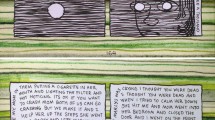Abstract
Hugh Howey’s science fiction trilogy, the Silo Saga, explores the relationship between apocalypse, trauma, and memory, invoking Shakespeare by referring to a play-within-the-novel—The Tragic Historye of Romeus and Juliette—whose title suggests that in this post-apocalyptic world, “Shakespeare” has somehow become “(not) Shakespeare.” In the fictional world of the novel, such a transformation results from the systematic loss and gradual recovery of cultural memory that occurs in the wake of traumatic events. At the same time, the novel dramatizes the coming of age of Juliette Nichols, who becomes “(not) Juliet(te)”—that is, neither Shakespeare’s Juliet nor The Tragic Historye’s Juliette—when she responds to her own personal tragedies and traumatic events by attempting to fix things and prevent future catastrophes. She revises the script that previously defined her, becoming “(not) Juliet(te)”—a tool-wielding cyborg who selects her own profession and rewrites her own prescribed identity.
Access this chapter
Tax calculation will be finalised at checkout
Purchases are for personal use only
Similar content being viewed by others
Works Cited
Barthes, Roland. “The Death of the Author.” In The Book History Reader. Edited by David Finkelstein and Alistair McCleery, 221–224. London: Routledge, 2002.
Berger, James. After the End: Representations of Post-Apocalypse. Minneapolis: U of Minnesota P, 1999.
Brooke, Arthur. The Tragicall Historye of Romeus and Juliet (1562). In Narrative and Dramatic Sources of Shakespeare: Volume I: Early Comedies, Poems, Romeo and Juliet. Edited by Geoffrey Bullough, 284–366. New York: Columbia UP, 1957.
Cartelli, Thomas, and Katherine Rowe. New Wave Shakespeare on Screen. Cambridge: Polity, 2007.
Conaway, Charles. “‘The … Monster which doth mock / The meat it feeds on’: R.E.M.’s Monst(e)rous Othello.” Journal of Adaptation in Film and Performance, 5, no. 1 (2012): 5–24.
Curtain Call at Bedrock. Directed by Joseph Barbera and William Hannah. Performed by Alan Reed, Jean Vander Pyl, Mel Blanc. Hannah-Barbera Productions, 1996.
Desmet, Christy. “Introduction.” In Shakespeare and Appropriation. Edited by Christy Desmet and Robert Sawyer, 1–12. London: Routledge, 1999.
Donaldson, Peter S. “Game Space/Tragic Space: Julie Taymor’s Titus.” In A Companion to Shakespeare and Performance. Edited by Barbara Hodgdon and W.B. Worthen, 457–477. London: Blackwell, 2005.
Foucault, Michel. “What is an Author?” In Textual Strategies: Perspectives in Post-Structuralist Criticism. Edited by Josué V. Harari, 141–160. Ithaca: Cornell UP, 1979.
Gnomeo & Juliet. Directed by Kelly Asbury. Performed by James McAvoy, Emily Blunt. Touchstone Pictures, 2011.
Grigely, Joseph. Textualterity: Art, Theory, and Textual Criticism. Ann Arbor: U of Michigan P, 1995.
Haraway, Donna. “A Manifesto for Cyborgs: Science, Technology, and Socialist Feminism in the 1980s.” In The Norton Anthology of Theory & Criticism. 2nd ed.. Edited by Vincent B. Leitch, 2190–2220. New York: Norton, 2010.
Howey, Hugh. Dust. Jupiter, FL: Broad Reach Publishing, 2013.
———. Shift. Jupiter, FL: Broad Reach Publishing, 2013.
———. Wool. New York: Simon & Schuster, 2012.
Hutcheon, Linda. A Theory of Adaptation. New York: Routledge, 2006.
Kidnie, Margaret Jane. Shakespeare and the Problem of Adaptation. New York: Routledge, 2009.
Lanier, Douglas. “Recent Shakespeare Adaptation and the Mutations of Cultural Capital.” Shakespeare Studies, 38 (2010): 104–113.
Richter, David H. “Theorizing Postmodernism.” In The Critical Tradition: Classic Texts and Contemporary Trends. 3rd ed. Edited by David H. Richter, 1920–1932. Boston: Bedford/St. Martin’s, 2007.
Shakespeare, William. Romeo and Juliet. In The Norton Shakespeare. Edited by Stephen Greenblatt, Walter Cohen, Jean E. Howard, and Katharine Eisaman Maus, 865–941. New York: Norton, 2008.
William Shakespeare’s Romeo + Juliet. Directed by Baz Luhrmann. Performed by Leonado DiCaprio, Claire Danes. 20th Century Fox, 1996.
Author information
Authors and Affiliations
Editor information
Editors and Affiliations
Rights and permissions
Copyright information
© 2017 The Author(s)
About this chapter
Cite this chapter
Conaway, C. (2017). “I’ll Always Consider Myself Mechanical”: Cyborg Juliette and the Shakespeare Apocalypse in Hugh Howey’s Silo Saga . In: Desmet, C., Loper, N., Casey, J. (eds) Shakespeare / Not Shakespeare. Reproducing Shakespeare. Palgrave Macmillan, Cham. https://doi.org/10.1007/978-3-319-63300-8_5
Download citation
DOI: https://doi.org/10.1007/978-3-319-63300-8_5
Published:
Publisher Name: Palgrave Macmillan, Cham
Print ISBN: 978-3-319-63299-5
Online ISBN: 978-3-319-63300-8
eBook Packages: Literature, Cultural and Media StudiesLiterature, Cultural and Media Studies (R0)




